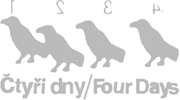
| Other
Use, Other Worlds, Evaluation of the project Other Use, Other Worlds, Other Reality
The International Performing Arts Project “Other Use, Other Words, Other Reality” was developed from the experience of those individuals who initiated or who have experience in the conversion of former industrial buildings into cultural and arts centres. The origin of cultural and arts centres in Western Europe in the 60´s and 70´s (Great Britain, Germany) and in the 70´s (France, Belgium, Holland, etc) fundamentally changed the cultural environment in Europe and initiated the development of many new important artistic projects and artistic collectives. The social changes and transformation of the economic structure in the 1990´s in the Czech Republic brought an end to the activities of many factories and industrial zones. The result of halting the production of the failing operations of factories and productions houses, as well as the traditional industries in our conditions, was the increase in the number of abandoned industrial buildings and sites. Questions also began to appear: “What to do with them? Leave it all to fate? Demolish them? Restore them? How can we use them again?”
Many theatre spaces in the Czech Republic do not reflect the current needs of contemporary dance and theatre art; and as a result young representative generation of artists lack the multi-functional spaces for artistic creation and presentation. Based on the results of the research conducted over the course of several years, and our experience in European collaboration, we initiated a project that would be a very clear argument for the politicians, cultural workers and most recently many artists and art school students as models of cultural use of former industrial buildings and areas in and Germany. How can we use historic and industrial buildings and other non-traditional spaces for the presentation of art? What kind of social, cultural or economic roles did the rejuvenation of these places play in Germany and Netherlands?
The project used different cultural and political experience of our partners in Germany and Netherlands. The transposed project abandons the traditional system of the repertory theatre that has its own company of artists and searches for the new use of former industrial buildings as open spaces for research, as ateliers, and as rehearsal spaces, where various kinds of dance, music, film and multi-media performances can be presented. This concept was something unusual and exceptional in the Czech Republic, where the tradition of Czech repertory theatre is deeply rooted and where every theatre building has its own artistic company.
PROJECT PHASES:
Charting and documenting the cultural, artistic, and residence centres in places of former industrial buildings and sites in Germany and Netherlands. Examples of industrial buildings and sites in Germany that have been successfully converted from their abandoned state or from their original use include: Berlin: Dock 11, Pumpwerk, Radialsystem, TanzFabrik; Bochum: Jahrhunderthalle, Friedlicher Nachbar; Bremen: Schlachthof, Schwankhalle; Dortmund: Depot; Düsseldorf: Tanzhaus NRW; Dresden: Motorhalle; Duisburg: Gebläsehalle, Kraftzentrale; Essen: Maschinenhaus Zeche Carl, Salzlager Kokerei Zollverein, PACT Zollverein; Gladbeck: Maschinenhalle der Zeche Zweckel; Hamburg: Kampnagel; Herne: Flottmann-Hallen; Langendeer: Kulturzentrum Bahnhof; Leipzig: Spinnerei / NATO ; Potsdam: Fabrik Potsdam; Weimar: E- Werk
Examples of industrial buildings and sites in Netherlands that have been successfully converted from their abandoned state or from their original use include: Amsterdam: de Westergasfabriek, de NDSM werf.., Melkweg, P60; Eindhoven: De Effenaar, Zeeland: de Vleeshal; Groningen: de Machinefabriek; Tilburg: de Pont.
Charting
and documenting the actual
condition of several industrial buildings and sites in
the Czech Republic with the prospect of
being newly used as a cultural, artist, or residence centre.
Examples of industrial buildings and sites in the Czech Republic that have been successfully converted from their abandoned state or from their original use include > Galerie Vaňkovka shopping centre – Brno (former ironworks), Gallery of Modern Art – Praha 7 (former factory), Karlín Studios – Praha 8 (former location of the ČKD – manufacturers of trams), Galerie Futura – Praha 5 (former pattern shop), C.k. Solnice – České Budějovice (a Gothic building formerly used as a storage house / granary), La Fabrika – Praha 7 (former ironworks), etc.
international round table – presentation of the project – A panel of Czech and foreign curators and artistic directors of „post-industrial“ cultural, artistic and residence centers, contributed to the round table with their experience and know-how. The round table also included film presentations of dance and theatre projects in non-traditional spaces located in the Czech Republic, Germany and Netherlands in addition to the accompanying artistic programme. Czech and international artists, architects, stage designers, conservationists, sociologists, organizers and other experts introduced themselves and presented their projects over the course of the two-day round table. The interdisciplinary conclusion of the round table became a broad platform for the exchange of experience and the presentation of interesting cultural phenomenon of the revitalization of industrial buildings and sites throughout Europe.
Suported By:
|
|
||

